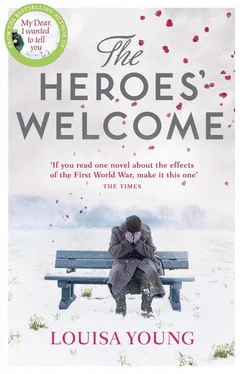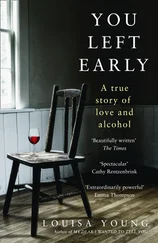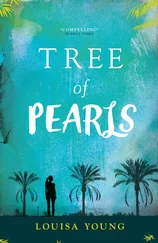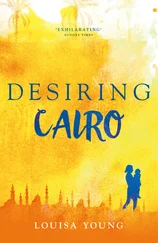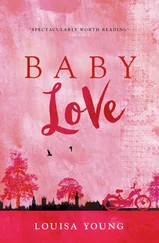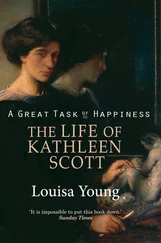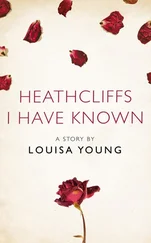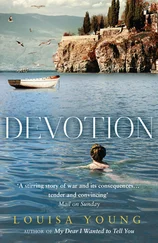Most days Julia worked herself up to try again.
‘Peter?’
A grunt.
‘There’s one thing I’ve been wondering about.’
A further, more defensive grunt.
‘It’s—’ from Julia, and at the same time from Peter: ‘Well, whatever it is, I’m sure it’s my fault.’
‘I wasn’t thinking about anything being … fault,’ she said.
Silence.
He had not looked up. It wasn’t the paper now, it was Homer. What might that mean? Why would he prefer to sit and read all day instead of being with us? Or going to the office like a proper man? It’s not as if he hasn’t read the Odyssey before …
His hair is looking thin.
He’s only thirty-three.
She let out a quick, exasperated sigh.
‘Peter darling, please listen to me.’
He turned, put down his book, looked up, and said, coldly and politely, with no tone of query in his voice, ‘What.’
Oh Peter!
‘I just want to know what happened!’ she burst out. ‘What happened to you?’
‘What happened?’ he said. He gave a little laugh of surprise. ‘Why, my dear, the Great War happened. Have you not heard about it? You might look it up. The Great War. The clue’s in the name. Now go away.’
She swallowed.
She still tuned his cello most days. He hadn’t looked at it since he’d been back. But he might.
He used to sing and make up little songs all the time. All the time! It was so sweet.

A few days later Julia knocked on Peter’s door again.
Go away , he thought. Go away.
‘What I was wondering,’ she said, loitering in his doorway, neither in nor out, ‘no, don’t say anything, please – I just … wanted to know what you thought.’
‘About?’ Peter said. He didn’t look up. Not out of unkindness, or lack of concern, but out of inability. Julia’s desperate goodwill tormented him – these constant interruptions – and then he was so foul to her – and her face – expressionless, taut, inhuman almost with those terribly human eyes glowing out – her face was a perpetual reproach. Look at her , he thought, though he couldn’t look at her .
‘I was wondering,’ she was saying, ‘about before the war …’
He raised his head and stared at her like a hyena about to howl.
‘Why on earth would you do that?’ he said.
‘I’m trying to remember whether we were ever happy.’
You want to remember happiness? Jesus Christ, woman, if one remembers happiness—
‘And whether my love for you is based on anything. I can’t remember. It’s been so long. I want to know. Because I think perhaps we were.’
Oh, God.
‘So what?’ he said, bewildered. ‘That’s the past. It’s dead.’ And – Ha! What a great big lie that is! he thought. If only it were dead. But it’s not even past. The past visited him most nights. Wandering about the wide gates and the hall of death, like Patroclus … She is no doubt thinking about some other past.
‘We were happy,’ she said, stubbornly. ‘We were happy in Venice, and we were happy that night at the Marsham-Townsends’, when we walked by the tennis court … my twenty-fifth birthday. And I was happy when you proposed to me …’
He lifted his mind. He had been thinking about the Trojan War; specifically about when mighty Achilles’ beloved friend Patroclus was killed in battle; about Achilles’ grief, how he locked himself away in his tent, went rather mad really, seeing ghosts and so on. He cut all his hair off, even though he’d promised it to a river god in exchange for a safe return home after the war. He’d refused to fight, though he was the greatest of the Greek heroes, and without him to lead them, the entire army lost faith, and every man in it was at risk. It was as if he no longer cared for his country, or for his leaders, or for his fellow soldiers – he only cared for his one friend. Peter had been thinking, is there an inherent contradiction in hating war and honouring soldiers? And then his mind had flung him back into thinking about soldiers. Dead ones. Loos and the Somme.
So with considerable effort, and for her sake, he lifted his mind from all that, and manoeuvred it round to Venice, and that night at the Marsham-Townsends’, and when he proposed to her. He remembered, for a moment, speaking to her appalling mother, and wondering what her father had been like. He tried to remember why he had proposed to her. Because we danced so well together – was that all? No. Because she was so beautiful? Yes – and … because she was so nice. She was soft, and gave kind advice. I was always pleased to see her when I turned up somewhere, and she was there. She was kind when my father died. All very straightforward, really. And I felt very tall with her on my arm.
All right, then. Yes, back in Arcadia, we were happy.
And at the thought of happiness, remembered happiness, his mind panicked and scattered: pure fear. He closed his eyes, clenched his mind, to hold on.
Hold on to your mind , he whispered to himself. Hold on. You’re tied to the mast. All right.
All right.
Now say something nice to the poor woman. Go on.
He couldn’t.

Julia tried to remember herself before she knew him. Desperate to please, obedient, bossed and squashed by her mother at every turn, her dear dad only a memory. She had realised the game early: the sweeter and prettier she was, the nicer people were to her.
And then there was Peter. How glad she had been to run to him, his amusement, his kindness.
To her, that night at the Marsham-Townsends’ sprang out, glistening with verisimilitude. She smelt the orange-flower water, saw the sheen of starch on the gentlemen’s shirt fronts, heard the waltz, felt the brush even of the palm-frond against her bare white shoulder and her skirts swirling at her ankles, as Peter wheeled her out on to the terrace, whispering – what had he whispered? Something mischievous.
Her mother had been delighted to give her to a man with a big house.
After they were married he’d said: ‘Let’s not have children immediately. Let’s run around and have some fun first.’ She had no idea there could be any choice – she’d known nothing about anything loving, about being on the same side with someone, and being happy together. Then suddenly there it was: she and Peter, together. Yes, happy!

He caught sight of her by the mirror in the hall. She was glancing at herself as he glanced at her. Her eyes fell away from her own taut reflection.
She did that , he thought, to her own face, to be more beautiful, because she thought I loved her for her beauty. She thought it would help. She thought that I, while fighting the bloody war, losing men, Atkins Lovall Bloom Jones oh stop it STOP IT – was most bothered by some idea that my beautiful wife was not beautiful enough. Somehow, apparently, evidently, I let her think that . Though, dear God, I do not understand why anybody would think that washing their face in carbolic acid was going to help anything. But – bad husband – I failed to protect her from this bizarre idiocy of her own. Just as I failed – bad soldier – to protect my men. Both at home and at the Front, I failed. And I wonder if anybody else on this earth can see that she is a casualty of that war just as much as Riley, or me …
Читать дальше
